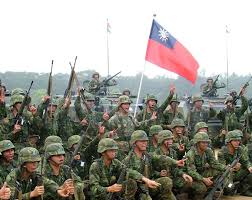Asia’s Silence On Gays In Military Broken By Taiwan
Scholars See Possible Trend in Taiwan’s Decision to Allow Gay Military Police
SANTA BARBARA, CA, – Following an announcement by the Taiwanese Military that it would end a policy banning gays from guarding high level officials and government installations, scholars and military officials said the decision signaled a bold step for an Asian military force. The policy change was announced after a local newspaper revealed the discriminatory practice, prompting protest demonstrations in Taipei, the nation’s capital.
According to scholars, activists and sources familiar with military practices in China, Korea, Japan and Taiwan, the status of gay soldiers in Asia has been largely unregulated due, in part, to a continued refusal to acknowledge the existence of homosexuality. “We never had a real discussion about this because we never heard about this kind of situation,” said Lt. Col. Louis Liu, Assistant Naval Attach in the Taipei Economic and Cultural Office in Washington. “We don’t have a policy in writing.” Col. Liu said that most gays in Taiwan remain closeted, “so if someone doesn’t mention that [he is gay], no one knows except him.” He added that, while sexual orientation may have been considered in promotional decisions in the past, he was not aware of anyone ever being discharged or prevented from serving because they were gay.
Military officials said that the policy governing gay soldiers in Taiwan does not refer specifically to homosexuality but to “sexual orientation impairment,” which traditionally has been interpreted to include homosexuals. In 1994, the defense ministry stopped treating homosexuality as an illness, but that same year, the military agreed to exempt men from conscription if psychiatrists concluded they were homosexual, according to a China Post report. Eddy Chang, Lecturer of English at National Taipei College of Business and a writer at the Taipei Times, said that since 1994, the nation’s army, navy and air force have not had a policy of screening out homosexuals.
In clarifying the policy on homosexuals in Taiwan, officials at the Ministry of Defense said gay men are not exempt from conscription. The announced modifications thus amounted to a new interpretation of “sexual orientation impairment” rather than an outright change in policy. “Previously, gays were viewed as having a psychiatric illness,” said a Colonel from the Ministry of Defense who requested anonymity. “But since we have to consider human rights, we now think that gays, if they abide by military discipline and regulations, of course they can serve in the military.” Yet Wang Ping, Secretary General of the Gender Sexuality Rights Association of Taiwan, said even the new policy is not that clear. “Now they will not not allow gay men,” she said, “but that doesn’t mean they will allow them.”
Though there is little Western scholarship on gays in the Taiwanese military, some lessons may be drawn from research into Japanese military culture. Sabine Fruhstuck, Assistant Professor of East Asian Languages and Cultural Studies at the University of California, Santa Barbara, has conducted extensive research into the experiences of gay soldiers in Japan. Fruhstuck explained that the Japanese military has no policy governing gay troops, partly because Japanese officials insist there are no homosexuals serving there. But, as in Taiwan, the official policy in Japan is hard to pin down. “If there is some kind of procedure to exclude gays,” she told researchers, “it wouldn’t be classified as a gay policy.”
Despite, or perhaps because of, Japanese culture’s refusal to recognize homosexuality, gay Japanese find themselves in a peculiar situation: they are hardly welcomed into mainstream cultural institutions; but at the same time, there is little organized opposition against them. “Overall in Japanese society, [homosexuality] is not a high-profile issue, so they don’t have much of a public policy about it,” said Fruhstuck. “Men in general don’t talk about their families” in professional settings. This emphasis on personal privacy can work in favor of gays. Unlike in the U.S., where the gay ban is often defended on the grounds of heterosexual “privacy rights,” in Japan, “the view would be that it would be a violation of [the gay] person’s privacy to make their sexuality an issue.” Indeed, Fruhstuck’s interviews with Japanese military personnel suggest that few people would oppose letting gays serve as long as it did not
interfere with their performance.
Nathaniel Frank, Senior Research Fellow at the Center for the Study of Sexual Minorities in the Military, a research unit of the University of California, Santa Barbara, said that Japanese and Taiwanese military policy toward gays had limited relevance to the situation in the U.S. “Japanese and Taiwanese attitudes toward homosexuality reflect the cultural norms of societies where gay communities are still largely underground,” he said. “While some nations in Asia appear to have liberalized legal and social restrictions on homosexuality, the relative freedom that gays now enjoy there is partly based on their willingness to operate off the public radar screen.”
Nevertheless, Frank said, the experiences of foreign militaries are instructive. “No government in Asia has as restrictive an official policy on gay soldiers as the one in the U.S. military,” he said. “As twenty-three nations-but not the U.S.-have now recognized, the most sensible policy for gay soldiers is no policy at all. They are just like straight soldiers.” Frank added that the Taiwanese “are taking important steps to honor the principles of democracy and human rights. The Pentagon and U.S. Congress could learn a thing or two from them.”
Col. Liu of the Taiwanese Naval Attach said that ending the ban on gays in the military police was “a good thing for a democratic society like ours. I don’t think this is really a big deal,” he said. “It just means Taiwanese society is more open and there are different choices now. If you’re gay and you can do the job, that’s fine.”
